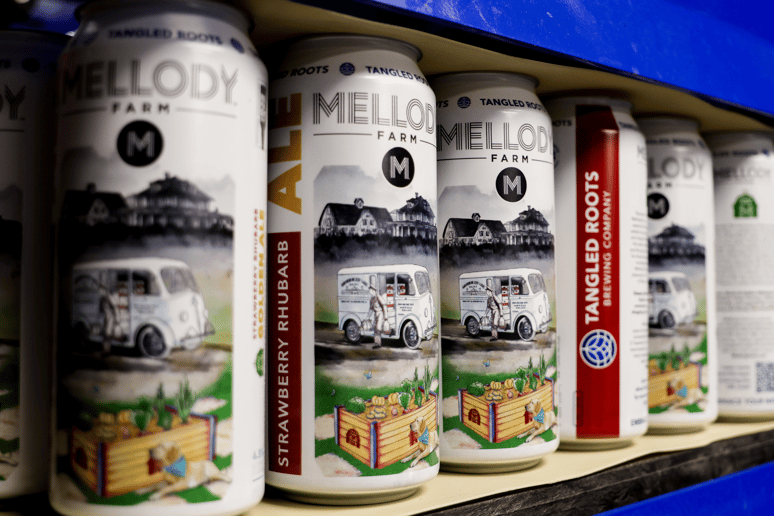Last year, the green space at Regency’s Mellody Farm in Vernon Hills, IL became something truly special — a place where sustainability and community came together in a whole new way. The launch of the Urban Farm turned an open space into a thriving garden, bringing fresh food to local families while strengthening connections among neighbors.
From June to October, the farm produced an impressive 300 pounds of vegetables and herbs, with 95% of the harvest donated to the Vernon Township Food Pantry. The rest was shared with Mellody Farm merchants, fostering even more local collaboration. This initiative embodied our Fresh Look® approach — prioritizing sustainability, innovation, and meaningful community impact.
A Fresh Take on Community Support
The idea behind the Urban Farm was simple: address food insecurity while redefining what it means to be part of a community. Despite being located in an affluent area, Mellody Farm discovered a significant need for fresh, locally grown produce for families struggling to put food on the table. By stepping in to help, the initiative made a real difference — one harvest at a time.
Beyond providing food, the farm was also designed to bring people together. Interactive experiences, tenant partnerships, and digital outreach helped increase foot traffic to the center and create deeper consumer connections.

Several Mellody Farm merchants were also active Urban Farm participants and supporters. Tangled Roots Brewing Company — a brewery providing a unique hospitality experience that combines authentic, local craft brewing with high-quality cuisine — created an exclusive specialty brew in honor of Urban Farm. Before selling out completely, Tangled Roots donated $1 to the Vernon Township Food Pantry for every strawberry rhubarb golden ale sold.
Turning Vision Into Reality
Making the Urban Farm a success took careful planning. Regency partnered with MicroHabitat, whose expertise kept the farm thriving from planting to harvest. The initiative was more than just about growing food — it was a full-scale effort to integrate sustainability into the shopping experience. A dedicated program brand, eye-catching signage, a microsite, and a beautifully designed garden enclosure all helped bring the vision to life.
To further amplify engagement, Keenam Jax, a pet content creator, was brought on board as a photographer and videographer, capturing moments that resonated with the community. Every aspect of the project was designed to align with local needs, creating an activation that was as impactful as it was innovative.
Cultivating a Better Future
What started as a sustainability initiative became a powerful example of how retail spaces can serve their communities in unexpected ways. The numbers tell the story.
/Property%20Events%20(Photos%20and%20Video)/929.Milwaukee.Avenue.VernonHills.2024.UrbanFarming.DSC_3657.jpg?width=1000&height=665&name=929.Milwaukee.Avenue.VernonHills.2024.UrbanFarming.DSC_3657.jpg)
Environmental Benefits
- Absorbed 123.76 kg of CO₂ — equivalent to the carbon capture of five mature trees per year
- Reduced air pollutants, contributing to cleaner air
- Offset 88.9 million Joules of heat — enough to power an LED bulb for over 850 days
- Improved stormwater management, reducing flood risks and strengthening local ecosystems
Community Impact
- 300 pounds of fresh produce donated to the Vernon Township Food Pantry
- 160 meals provided to Team No Kid Hungry
- 500 edible plants supporting local biodiversity
- Recognized as the highest-yielding farm in the Greater Chicago Area by MicroHabitat
- Regency donated an additional $2,500 to the food pantry, funding 7,500 meals for families in need
- Vernon Township awarded the initiative a special resolution in recognition of its impact
 The Urban Farm was a unique opportunity to bring sustainability and positive change together in a meaningful way,” said Alisa Taggart, Property Marketing Manager, Central and West Regions. “Seeing the farm thrive — not just in the produce it yielded, but in the connections it fostered — was incredibly rewarding. This initiative truly exemplifies how retail spaces can play a bigger role in supporting local communities.
The Urban Farm was a unique opportunity to bring sustainability and positive change together in a meaningful way,” said Alisa Taggart, Property Marketing Manager, Central and West Regions. “Seeing the farm thrive — not just in the produce it yielded, but in the connections it fostered — was incredibly rewarding. This initiative truly exemplifies how retail spaces can play a bigger role in supporting local communities.
As we look ahead, the success of the Urban Farm is a reminder that when we invest in our communities, everyone benefits. And at Mellody Farm, this is just the beginning.